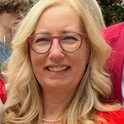In Chapter 5, we find Jesus at a pool in Jerusalem surrounded by people seeking healing in the waters. Jesus approaches a man who has been ill for 38 years. His question, “Do you want to be made well?” (v6) evokes a response from the man indicating healing is not possible because he has no one to carry him to the pool. Instructing the man to rise, take his mat and walk, Jesus heals him and disappears into the crowd. There were no preconditions for healing—a man who had given up hope is restored to wholeness.
Our newly-healed friend encounters Jewish leaders who focus solely on the fact that his healing broke a Sabbath rule, showing no consideration for the man released from his years of suffering. In first-century Judaism, Sabbath was one of three practices that defined community identity; breaking one of these laws was a direct challenge to authorities. When they find out it was Jesus, they confront him. Jesus’ defense, “My Father is working, and I also am working” (v17) further inflames his detractors. Now Jesus has really done it—he has broken a Sabbath law and claimed equality with God!
Jesus presents evidence of his intimate relationship with God. In addition to the witnesses of John the Baptist and Moses, revered prophets, Jesus says, “The works that the Father has given me to complete, the very works I am doing, testify on my behalf” (v36). Despite this strong argument, Jewish officials persist in their outrage and begin planning Jesus’ death. They have all the information needed to believe Jesus, but their need for power and control has rendered them unable to hear the truth. Jesus said, “Very truly, I tell you, the hour is coming, and is now here, when the dead will hear the voice of the Son of God, and those who hear will live” (v25). These leaders, in striving to maintain the status quo, remain in spiritual darkness and miss the opportunity to receive life. Jesus came so we could be made well—we just need to listen for His voice.

Carol Schierlmann currently serves as the Director of Spiritual Development at Advent Lutheran Church in Charlotte, NC. She felt God calling her to a new path in 2017 and entered Union Presbyterian Seminary where she completed a Master of Arts in Christian Education. She is particularly interested in helping folks find the blessings in spiritual practices and deeper examination of holy texts.
To Consider
1. The man by the pool had lost any hope of healing when Jesus approached him with the offer to be made well. Does this example of God’s grace offer hope in an area of your life or in the world?
2. In verses 10-18, the Jewish leaders opposed Jesus because he challenged the established rules of the synagogue. When do we, in contemporary church life, reject the teachings of Jesus because they challenge existing church structures?
Prayer
God of healing, thank you for loving us so completely and without condition! Open us to receive all the teachings of Jesus designed to make us well in all areas of our lives. If there is something in Jesus’ words or deeds that challenges our structural thinking, give us the courage to dismantle what we have mistakenly embraced. Amen.
